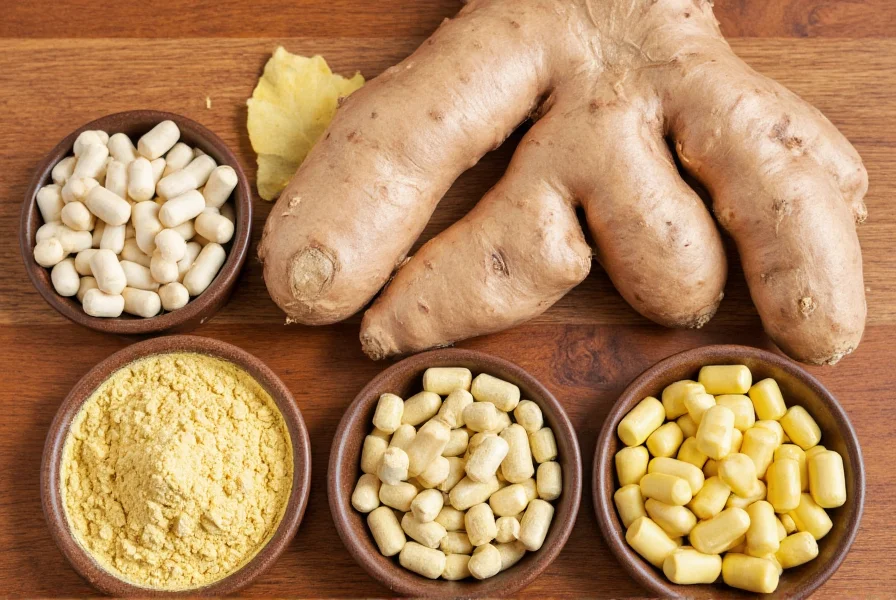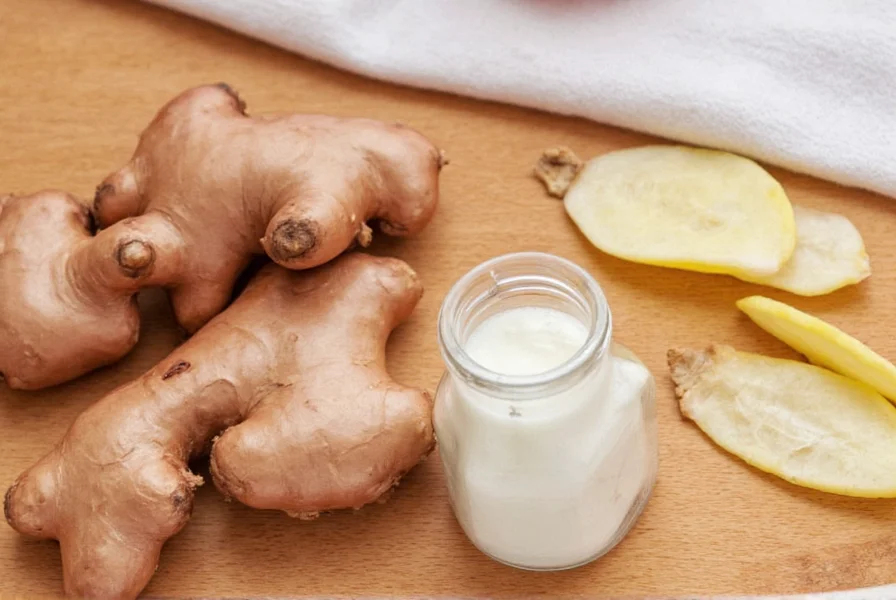For centuries, ginger has been revered across cultures not just as a culinary spice but as a powerful medicinal plant. Modern science is now validating what traditional medicine practitioners have known for generations: this knotted rhizome packs a remarkable punch for human health. Unlike many trendy "superfoods," ginger's benefits are backed by substantial clinical research, making it one of the most scientifically supported natural remedies available.
The Science Behind Ginger's Healing Power
Ginger's therapeutic properties primarily come from its bioactive compounds, especially gingerols and shogaols. These potent phytochemicals interact with multiple physiological systems in the body. When you consume ginger, these compounds are absorbed into your bloodstream where they modulate inflammatory pathways, interact with neurotransmitters involved in nausea, and influence digestive processes.
Unlike pharmaceutical drugs that typically target a single pathway, ginger works through multiple mechanisms simultaneously. This polypharmacological approach explains why ginger can address such a wide range of health concerns without the side effects commonly associated with single-target medications.

Proven Health Benefits of Ginger Root
Nausea and Vomiting Relief
Ginger stands out as one of the most effective natural remedies for various forms of nausea. Multiple clinical trials demonstrate ginger's effectiveness for:
- Morning sickness during pregnancy (studies show 70-85% reduction in symptoms)
- Post-operative nausea (comparable to conventional anti-nausea medications)
- Chemotherapy-induced nausea
- Motion sickness
A comprehensive 2020 review published in Nutrients analyzed 12 clinical trials involving over 1,200 participants and concluded that ginger significantly reduces nausea severity across multiple contexts. The recommended dose for nausea relief ranges from 1-1.5 grams of powdered ginger or 4 grams of fresh ginger daily.
Digestive Health Enhancement
Ginger stimulates digestive enzymes and accelerates gastric emptying, which explains its traditional use for indigestion and bloating. Research shows ginger can reduce symptoms of functional dyspepsia by up to 30% compared to placebo. The compound [6]-gingerol specifically enhances gastrointestinal motility while reducing spasms.
Inflammation Reduction and Pain Management
Ginger's anti-inflammatory properties rival some non-steroidal anti-inflammatory drugs (NSAIDs) without the gastrointestinal side effects. A landmark study in Arthritis and Rheumatism found that ginger extract reduced osteoarthritis pain by 30% after six weeks of treatment. The mechanism involves inhibition of COX-2 and 5-LOX enzymes, similar to how prescription anti-inflammatories work but through a more balanced approach.
| Health Benefit | Effective Dose | Time to Notice Effects | Scientific Support Level |
|---|---|---|---|
| Nausea relief | 1-1.5g powdered ginger | 30-60 minutes | ★★★★★ (Strong) |
| Digestive improvement | 2g fresh ginger | 1-2 hours | ★★★★☆ (Good) |
| Pain reduction | 500mg-1g extract daily | 2-4 weeks | ★★★★☆ (Good) |
| Antioxidant protection | Regular dietary intake | Long-term | ★★★☆☆ (Moderate) |
Cardiovascular Support
Emerging research suggests ginger may improve several cardiovascular risk factors. Studies indicate ginger can modestly reduce LDL cholesterol (by approximately 10-15%) and lower blood pressure through its effects on vascular tone. The antioxidant properties also help prevent oxidation of LDL cholesterol, a key step in atherosclerosis development.
Antioxidant and Immune Support
Ginger contains potent antioxidants that combat oxidative stress throughout the body. These compounds help neutralize free radicals and enhance the body's natural antioxidant defenses. While not a replacement for vitamin C, ginger's immunomodulatory effects make it a valuable addition to immune-supportive diets, particularly during cold and flu season.

How to Maximize Ginger's Benefits
To get the most from ginger's health-promoting properties, consider these evidence-based usage tips:
- Fresh vs. processed: Fresh ginger contains higher levels of gingerols, while dried or cooked ginger has more shogaols, which have different but complementary benefits
- Optimal preparation: Grating or crushing fresh ginger and letting it sit for 5 minutes before use increases the bioactive compounds
- Daily incorporation: Add 1-2 teaspoons of grated ginger to morning smoothies, teas, or salad dressings
- Therapeutic dosing: For specific conditions like nausea or inflammation, consider standardized extracts providing 5-10% gingerols
Safety Considerations and Potential Side Effects
Ginger is generally safe for most people when consumed in food amounts or moderate therapeutic doses (up to 4 grams daily). However, certain individuals should exercise caution:
- People taking blood thinners should consult their doctor due to ginger's mild anticoagulant properties
- Those with gallstones should use ginger cautiously as it stimulates bile production
- Excessive consumption (more than 5 grams daily) may cause heartburn or mouth irritation
- Pregnant women should limit intake to 1 gram daily for nausea relief unless directed otherwise by their healthcare provider
Unlike many pharmaceutical options for nausea or pain, ginger rarely causes significant side effects at appropriate doses, making it an attractive option for long-term management of chronic conditions.
Integrating Ginger Into Your Wellness Routine
For those seeking natural approaches to support digestive health, manage inflammation, or reduce nausea, ginger offers a scientifically validated option. The key is consistent, appropriate use rather than expecting immediate miracle results. Incorporate ginger into your daily routine through:
- Morning ginger tea (steep 1-2 inches of fresh ginger in hot water for 10 minutes)
- Adding grated ginger to stir-fries, soups, and salad dressings
- Taking standardized ginger supplements for specific therapeutic purposes
- Using ginger in baking for both flavor and health benefits
Remember that while ginger provides significant health benefits, it works best as part of a comprehensive approach to wellness that includes a balanced diet, regular exercise, and appropriate medical care when needed.
Frequently Asked Questions About Ginger's Health Effects
How much ginger should I take daily for health benefits?
For general health maintenance, 1-2 grams of fresh ginger daily (about a 1-inch piece) provides benefits. For specific conditions like nausea, research shows 1-1.5 grams of powdered ginger or 4 grams of fresh ginger divided throughout the day is effective. Therapeutic doses for inflammation typically range from 500mg to 1 gram of standardized extract daily. Always start with lower doses to assess tolerance.
Can ginger help with weight loss?
While ginger isn't a weight loss miracle, research suggests it may support metabolic health. Studies show ginger can modestly increase thermogenesis (calorie burning) and improve markers of metabolic syndrome. A 2019 review in Nutrition Reviews found ginger supplementation associated with modest reductions in body weight and waist-to-hip ratio, particularly when combined with a healthy diet and exercise. The effect is supportive rather than dramatic.
How long does it take for ginger to work for nausea?
Ginger typically begins working within 30-60 minutes for nausea relief. For motion sickness, take ginger 30 minutes before travel. For morning sickness, many women find relief within an hour of consuming ginger tea or capsules. Post-operative studies show significant nausea reduction within 2 hours of ginger administration. Consistent daily use provides the best results for chronic nausea conditions.
Is fresh ginger more effective than powdered ginger?
Both forms offer benefits but contain different active compounds. Fresh ginger has higher levels of gingerols, which provide anti-nausea and digestive benefits. Dried or powdered ginger contains more shogaols, which have stronger anti-inflammatory properties. For nausea, fresh ginger may be slightly more effective, while powdered ginger works better for inflammation. Many experts recommend using both forms depending on your specific health goals.
Can I take ginger with blood pressure medication?
Ginger may enhance the effects of blood pressure medications due to its mild hypotensive properties. If you're taking medication for high blood pressure, consult your healthcare provider before adding therapeutic doses of ginger to your routine. Dietary amounts (like using ginger in cooking) are generally safe, but higher supplemental doses (more than 2 grams daily) could potentially cause blood pressure to drop too low when combined with medication.











 浙公网安备
33010002000092号
浙公网安备
33010002000092号 浙B2-20120091-4
浙B2-20120091-4